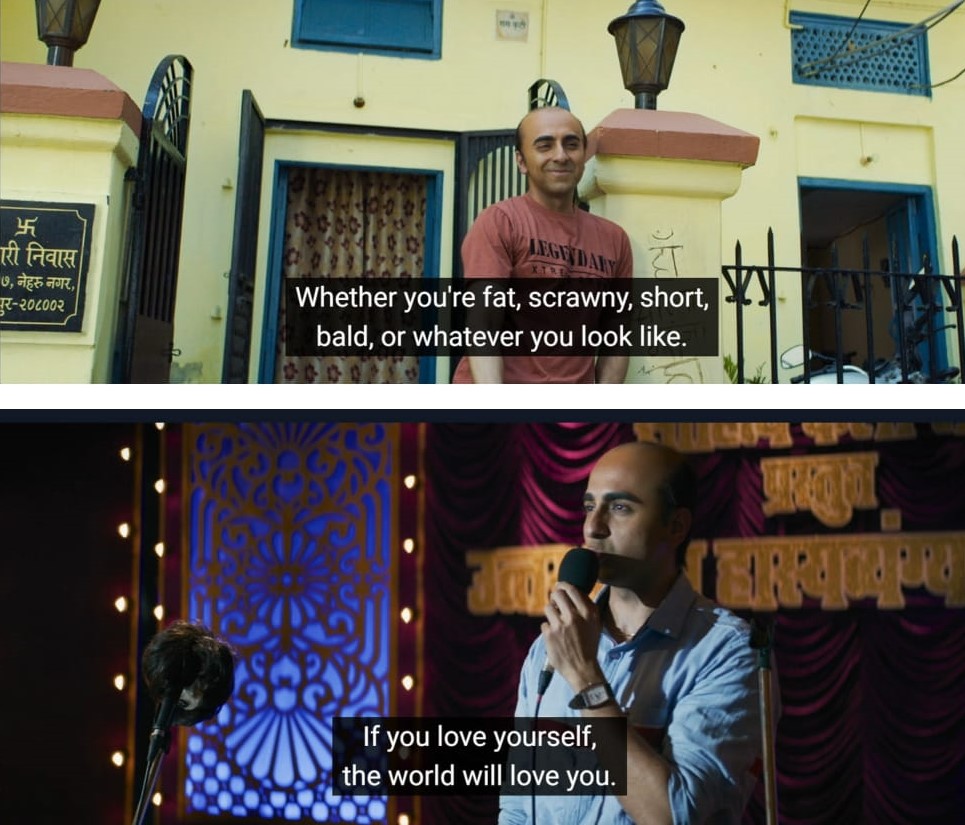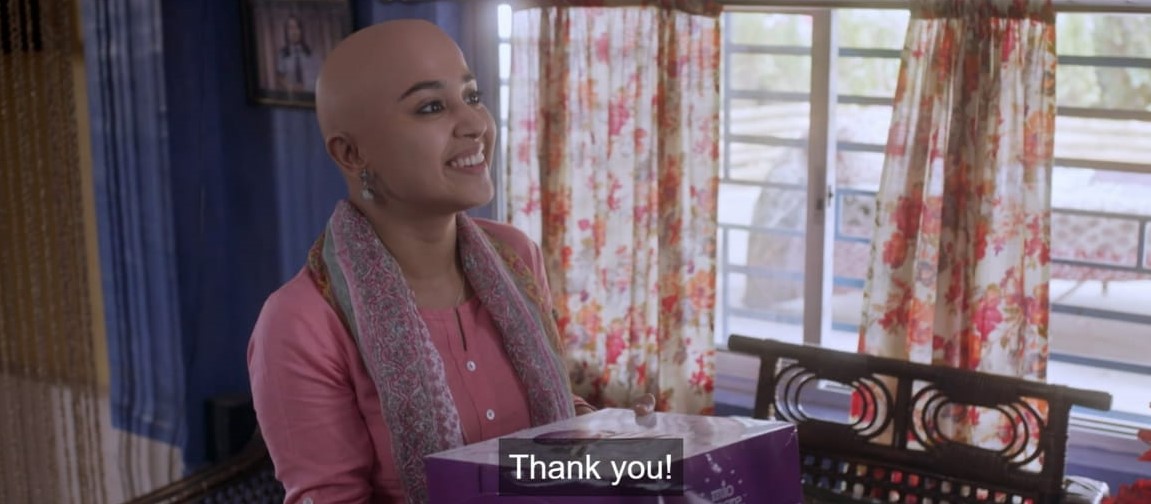A male comedian takes a jibe at a woman’s baldness publicly and her husband slaps him on that very stage in a defensive move. The whole world talks about it for days—will the husband apologise; will the comedian accept the apology; how does the comedian feel about being assaulted publicly? Not a single commentator stops to check and ask how the woman, who was the topic of the joke unwillingly, feels about the whole affair. Is she alright? How does it impact people around the world who suffer from the same or a similar condition? Is the lesson here that making fun of someone’s appearance or condition is fair game or that beating someone up for making fun of your spouse (on live television) fair game? That even if you are the punchline of the joke, you will not be the talking point of the conversation? The discussions online will not shift to how we need to be sensitive to those suffering from alopecia or pattern baldness.

While Bollywood seems to be making progress in telling these stories as authentically as possible, Hollywood seems to have gotten itself in a pickle. Before the slap gate at the Oscars and the pandemic, Bollywood was having a big year with stories of baldness. And before alopecia became a hot topic because of Chris Rock’s thoughtless jibe at Jada Pinkett Smith, Bollywood was already dealing with this issue. Three films released simultaneously that addressed this extremely common phenomena in India—pattern baldness. With the exception of Gone Kesh that focused on a teenage girl suffering from alopecia and her struggles with the society’s standards for female beauty, Bala and Ujda Chaman delved into the anxieties of young, unmarried men and the confidence that hinged on having good hair. In Bollywood, only character actors have the luxury of getting away with being bald. Even Rajnikant doesn’t play his lead roles without a wig. For women, hair holds an even stronger importance as evidenced by an entire roster of Hindi songs focusing on women’s hair—Ye Reshmi Zulfen, Udein Jab jab Zulfein Teri, etc. While pattern baldness is quite common in India, alopecia is rare and so is the film made on the subject. Gone Kesh is a rare find, not simply because of the subject matter but because of its heartfelt characters. The film suffers a bit because of its length and deserved better editing but that shouldn’t take away from the fact that it addresses not just this disease but an entire journey of self-acceptance where the character is surrounded by understanding and loving parents.
The titular moment in Gone Kesh that defines the entire struggle of the protagonist is when she has to take to stage during a dance competition and decides to leave her wig behind while performing. The crowd gives her a thunderous applause. For the protagonist, Enakshi, finding someone to marry or accept her is not the ultimate goal, the final goal is self-acceptance and following her passions, with or without hair. The world will always have something to say to even the most flawless of beings and for those whose flaws are visible, the society leaves little space to breathe. That is possibly what Enakshi and Jada Pinkett Smith have in common.
Women, cool women, are simply expected to address their visible flaws (that may not even be flaws unless viewed from Hollywood’s beauty standards). Cool comedians who are women are also expected to turn themselves into a punchline—let me make that joke really fast and get it out of the way. Amy Schumer does that whenever she calls herself a “model” and the entire venue bursts into collective laughter.
For some reason, the films Bala and Ujda Chaman dealing with male pattern baldness feel the need to pit the balding protagonist against a woman fighting her own battle against the societal beauty standards whether it is her complexion or her weight. The woman is confident and accepting of her appearance and doesn’t seek “solutions” or outside approval unlike the balding men who will try anything to get their hair back or deceive marriage prospects using hair extensions among other means. These films also perpetuate the idea that the women are somehow lacking due to their skin colour or body weight and if they don’t need to make up for that lack, neither does the protagonist. Instead of looking at the protagonist in Bala as lacking sensitivity towards others’ struggles and be accountable for his actions, Bala seeks to make us accepting of these desperate and deceptive men once they come to accept their hair struggles. Why is it that the women need to be a punchline or a compromising standard for these men? It is a question I also ask every time Amy Schumer makes a joke about her body. Women, cool women, are simply expected to address their visible flaws (that may not even be flaws unless viewed from Hollywood’s beauty standards). Cool comedians who are women are also expected to turn themselves into a punchline—let me make that joke really fast and get it out of the way. Amy Schumer does that whenever she calls herself a “model” and the entire venue bursts into collective laughter.
Remembering and revisiting Gone Kesh at this moment felt like a breath of fresh air. Women aren’t cruelly unaccepting of baldness as the films Bala and Ujda Chaman project, they are unaccepting of deception. At a time when people with alopecia and baldness are seeing this strange Oscars’ incident get limelight every day, the real question is not about these men or their jokes or their assaults and apologies but whether this is the precedent set for how you can speak to women in public spaces. The truth is that I’ve never heard anyone speak about JK Simmons or Bruce Wills or Rajnikant as anything other than a great actor. The worst joke they could throw at JK Simmons was that he looked like an older Timothee Chalamet. The best Rajnikant jokes are all about his supposed superpowers. Bollywood thinks that once a man is bald, he should just “compromise” and settle for women who are overweight and dark complexioned when the truth is that these women deserve better men than those trying to settle for them or judge them on the basis of their body weight or complexion. Bhumi Padnekar plays a dark-complexioned Latika who spent her childhood being teased by Ayushmann Khurrana’s Bala and in the end, when Bala realises the error of his ways and discovers that he is in love with her, he confesses his love to her, only to be rejected. Latika’s rejection stems from her desire to be loved and accepted and not settled for. Bala eventually preaches self-love and comes to accept himself for who he is.

That is why Gone Kesh goes a step further than any other pop culture moment in recent years because it shows a loving relationship between Enakshi and her love interest Srijoy that is deeper than outer beauty and creates a space where the person suffering from alopecia doesn’t feel the need to hide or feel apologetic for their condition or settle for less, and that eventual goal is always self-acceptance and confidence in yourself. Despite what the deterrent films or the perfection-obsessed industry dictate, beauty is not skin deep and though Bollywood is quite ahead of other industries in addressing this topic, with special thanks to Qasim Khallow’s Gone Kesh, it still has miles to go.

